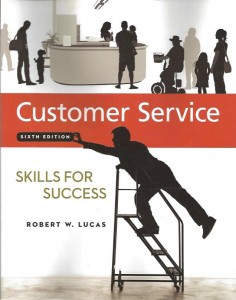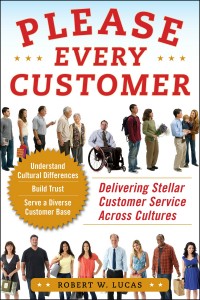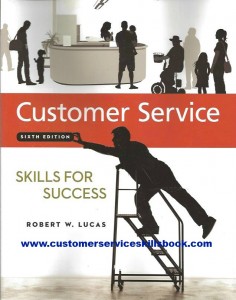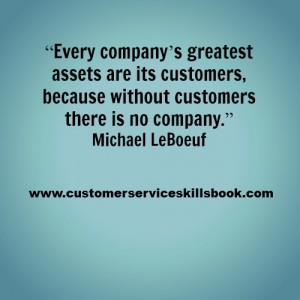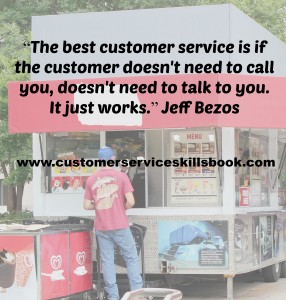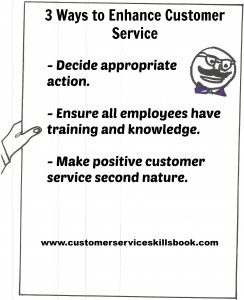
The Cost of Poor Customer Service
A recent experience with Century Link recently validated what I regularly tell customer service workshop participants and readers of my customer service books. I thought I’d share it with you along with customer service success tips that can improve customer service in any organization.
To reduce expenses, I decided to switch from my current Internet and cable provider to bundle those services along with my phones with Century Link. The technical process was fairly smooth, but the customer service support (or actually the lack of) has been a nightmare. On Monday after signing the agreement on the previous Thursday, I was on the phone for 4.5 hours with four different customer service representatives and a supervisor trying to resolve an issue related to the switch. On Wednesday, I spoke to three different Century Link employees, on Thursday two technicians came out to do the actual change over for Internet and cable and on Friday I was on the phone from 9:50 a.m. to 12:38 p.m. with seven customer service representatives and two supervisors. All for basically the same concern that I had.
In a nutshell, each person I talked to said the issue was resolved with my phone settings and service and that everything was set as promised in the agreement. In truth, that was not the case and I had to call back (multiple times) to let them know it was not resolved. I then had to repeat the story and what the previous person had said or promised (like many customers I am one of those people who write down the time periods of a call, name of the person I talked with and what was said in case something goes wrong). In virtually every new call situation, I was told there were no notes from the previous all in the system and that what was promised had actually not been done, so we had to start all over.
During the process over several days, there were three disconnects when the customer service representative attempted to transfer me or put me on hold. My phone was even totally disconnected at one point for almost a day because of an error on the part of one of the customer service agents. And the story still goes on unresolved as I wait for a second technician to arrive today…
Through all of this, there was a respite from the torture that I was enduring. An angel in the guise of a supervisor named Joan. Unlike a previous supervisor who listened to my issue and offered nothing but two unacceptable solutions, with no apology for my inconvenience or trouble, she took appropriate steps to get a repair call scheduled, apologized numerous times, did resolve a couple of the issues I had, and gave me a credit due to the phone disconnect. It was only when she transferred me to the repair department line that the torture came back with dropped calls and people who one after another told me incorrect information or failed to follow through.
This entire experience reinforced to me the importance of proper customer service training for anyone who is going to deal with customers on the front line. Everything that they do and say will likely have far-reaching implications for the representative and their organization. For example, I have told at least four of the friends of my experience and I am now relating it to you.
If you are a customer service representative dealing with external customers or an employee with internal employees, make sure that you take the following actions with every customer contact in order to better ensure a positive outcome and experience for your customers and potential customers:
Learn everything possible about your organization’s products and services. Customers assume that when someone answers the phone to represent an organization that they can truly assist with questions and issues.
Do not use statements that belittle your role and authority. For example, “I’m only an order taker.” In such instances, your customer immediately discredits you and asks to speak to someone with authority and advanced knowledge. They are also likely to become very irritated at having wasted their time with someone who could not have helped them in the first place.
Avoid tentative language. Customers call for a reason; not to just chat with you. They normally have a question, concern, or problem that they need your assistance in resolving. The last thing they want to encounter is a customer service representative who uses statements, such as, “I think,” “I’ll try,” “Maybe I can,” or similar non-committal phrases. Tell you, customers, what you can do, not what you think you can or cannot do. Statements such as, “I can/will” go a long way in reassuring the customer that the correct information will be provided or action will be taken.
Always maintain a positive attitude. Customers generally do not care what kind of day you are having, issues you face on the job and restrictions that you have in the workplace. They want quality customer service and to receive help with their situation or question. If you cannot provide this, you should not be answering a phone or making contact with a customer.
Do what you say that you will. Under-promise and over-deliver should be your motto. Do everything you can to assist the customer and if you do not have an answer or authority, get them to the correct person.
NEVER do a blind transfer. This is a situation where you attempt to transfer a customer to another person or department for further assistance and once that party picks up, you disconnect from the call. In many instances (such as mine) the number to whom you transferred the customer is not the correct one or there is music or recordings playing. Get an actual person on the line when transferring, ensure that they are the right person for the issue that you’ve explained to them and then reconnect to the customer. Introduce the customer to the second representative, thank them for calling and them professionally disconnect. Your job is done at that point. In my case above, there were at least three instances where I got transferred to a number only to have the call disconnect or have to go through a voicemail option system that ultimately led me back to the customer service department from which I was originally transferred in the first place.
Put yourself in the customer’s place. How would you feel if you experienced negative service such as I described at the beginning of this article? Chances are you’d be looking for a way to vent and share your experience with others.
In my case, I shared my thoughts and suggestions for improvement with Joan and asked her to send them up to her chain of command. With all the notes I took throughout the various calls, I could write a letter to the president of Century Link, as I’ve done numerous times in the past to other organizational leaders. In this case, the issues are so egregious and diverse, and the blatant lack of service is so obvious; I can only assume that the managers at Century Link already know about them, but choose to ignore them and do not properly train their staff.
Unfortunately, in a downsized world where organizations continually raise prices and look for ways to cut expenses, customer service training is viewed as a “nice to do” function, but is often limited or cut entirely. In the latter case, managers depend on other more senior customer service agents to conduct on-the-job training. That typically leads to poor quality of customer service, misinformation and people using a variety of techniques based on what they were taught. In the end, the customer, you and your organization suffer.
For more ideas on customer service strategies on how to meet customer expectations, deliver excellent customer service, increase customer satisfaction and loyalty, and reduce customer attrition, get copies of Customer Service Skills for Success and How to Be a Great Call Center Representative.

